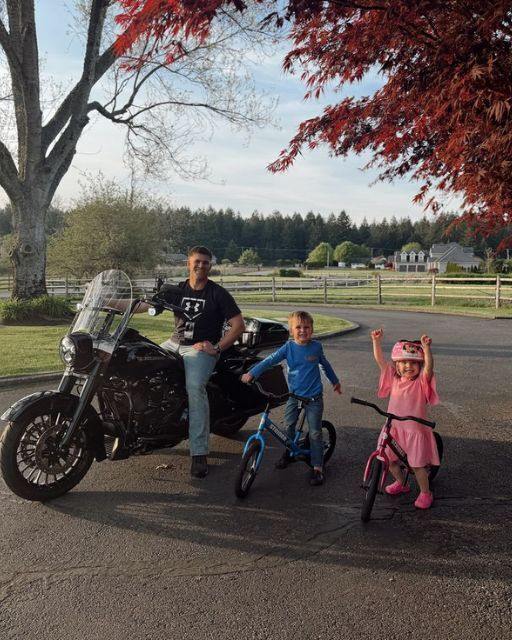
It sat in the garage, gathering dust like the rest of the life I was trying not to think about. Every time I passed it, I saw her. Mia’s laughter echoing in my head, her arms wrapped tightly around me, her chin resting on my shoulder, that ridiculous bubblegum pink helmet she insisted on wearing. We used to call the Harley our therapy couch. Long rides, no destination, no talking—just the hum of the engine and the wind smoothing out whatever had been too heavy to carry.
But after the accident, I couldn’t ride. I couldn’t even look at it without feeling like the air was being sucked from my lungs. I had two kids now, and whatever part of me had craved the open road was buried under fear and responsibility. So I sold it to a guy named Rick. Told myself it was part of moving on. That holding onto the past would only make things worse.
What I didn’t expect was how much of Mia lived in that bike—not just for me, but for our kids too.
Grief didn’t stop with the sale. It only changed shape.
Jace, my 7-year-old, once stood in the garage and whispered to the empty space where the Harley used to be. I asked him what he was doing. “I’m telling Mom about my drawing,” he said. “She liked when I told her stuff on the bike.” I had to step outside and pretend the wind had gotten in my eyes.
Lila stopped drawing altogether. She was only four, but she used to fill pages with stick figures of our family riding through clouds and forests. One day the drawings stopped. So did her singing.
I thought I was protecting them—by letting go of the reminders, by pretending everything was okay. But sometimes, letting go too soon leaves you emptier than before.
Then it happened.
One Saturday afternoon, the kids burst into the house, faces lit with a strange mix of confusion and excitement. “Dad!” Jace shouted, breathless. “There’s a man on your bike!”
At first, I thought they were mistaken. But when I stepped outside, there it was—my Harley. Same flaming tank, same scuff on the right handlebar, the same feeling that hit my chest like a freight train. It was Rick. He hadn’t changed a thing.
The next morning, he knocked on the door.
“I met your kids,” he said. “They told me about Mia. About you.”
He held out a folded flyer: The Iron Circle Riders.
We ride together. No one rides alone.
He smiled. “I’ll sell it back to you for the same price. But only if you join us for one ride.”
I didn’t answer right away. But something about the way he said it—like it wasn’t just about a ride, but about something else—stuck.
That Sunday, I rode again.
It had been a year since I felt the roar of the engine beneath me, the pulse of the machine syncing with my own heartbeat. We rode forty miles along the backroads, through fields and hills and long empty stretches where it felt like the whole world had paused. The wind hit my face, and Mia was everywhere—in the sunlight, in the silence, in the rhythm of the ride.
A woman named Tasha rode beside me. She had a braid down her back and soft, steady eyes. We pulled over halfway through, and I told her about Mia. About the pink helmet. The accident. The kids. The guilt.
“She’d be proud,” Tasha said. Not out of pity, but with the kind of quiet conviction that made me believe her.
When Rick handed me the keys after the ride, I didn’t hesitate. I took them.
That night, we rode again—but this time, it was different.
Jace sat behind me, arms tight around my waist. Lila was in a sidecar Rick had installed for his granddaughter. We cruised through the quiet streets, moonlight painting silver lines on the pavement.
Jace leaned in and whispered, “Mom would love this.”
And in that moment, I realized something I hadn’t been ready to before:
I never had to ride alone.
Not with Mia in our memories. Not with the wind carrying her laugh. Not with my kids holding on tight.